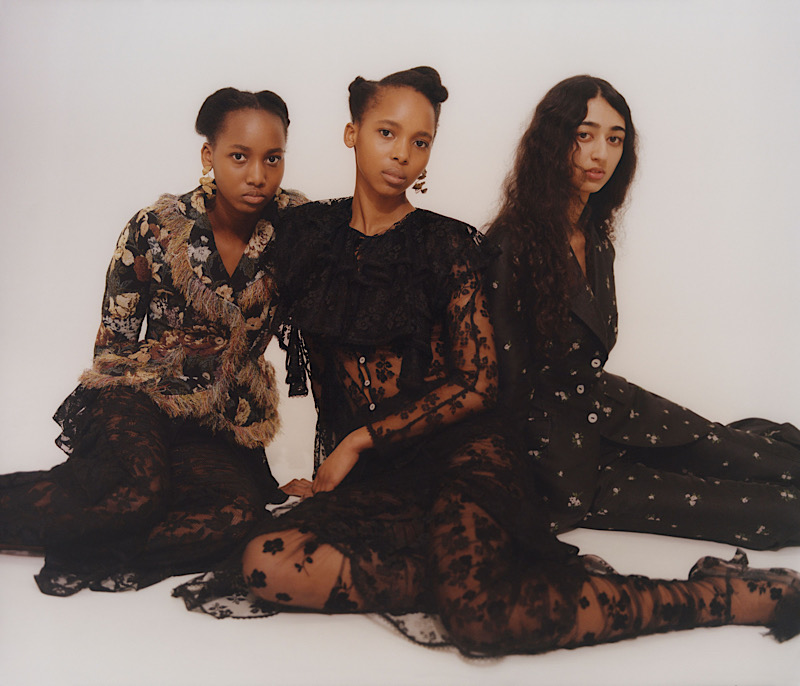“It’s not all about how you look, it’s a shared love for softness, delicacy and a romantic spirit,” says Chinese-born, London-based designer Yuhan Wang, 30, on her namesake label and its serious cult following. After launching with London’s prestigious talent incubator Fashion East in 2018, Wang has surprised and delighted with her elegant, intricate and sensuously unravelled aesthetic, which, at times, can be a little macabre.
Using her experience of living and studying in Beijing, New York and London, the Central Saint Martins (CSM) graduate has a knack for cleverly layering cultural references from the east and west. “I learned how to hone the discipline of my craft in China, even though there were limitations,” says Wang. “The freedom in New York has shaped the way that I think and CSM has encouraged me to analyse my past and apply it to my practice.”
Boasting a global roster of stockists—from Browns in London and Dover Street Market in New York to Beams in Tokyo—Wang’s label has grown tremendously since its launch. The secret? Consistency in brand identity, prioritisation of diversity and inclusion and, of course, exceptionally beautiful clothes. “People are tagging me on Instagram and I’ve seen different types of girls and boys wearing my collections, which is just so wonderful,” says Wang.
Over Zoom, Vogue caught up with the designer to find out how her eponymous label came to be, the importance of connecting with the audience and her hopes for a positive year ahead.

Where does your interest in fashion and making clothes come from?
I grew up in Weihai, a port in north China. We didn’t have much access to the Internet when I was growing up, so we watched a lot of Chinese period dramas. My sister and I would dress our dolls up with paper scraps and candy wrappers, then we reenacted the things we saw on TV. Then, for at least 10 years, I learned traditional Chinese landscape painting. Then I went to university in Beijing where I learned to drape and pattern-cut.
Your clothes are always so historically referential. Are there any eras that you were interested in when you were younger?
The Regency period for women in the west; the proportions and the way everything matches, with varying materials layered. In the east, there are some similarities that I love, too, such as the use of jacquard and mixed-weighted silks decorated with beads and pearls. It’s also important for me to generate ideas from personal experiences. It’s about sharing a mixture of my years in China, New York and London.
What compelled you to launch your brand?
I didn’t do it intentionally, I always wanted to work for someone. After I graduated, and while I was waiting for my work visa, Lulu Kennedy [founder and director of Fashion East] invited me to show for them. After that, buyers contacted me asking about where they could purchase the collection. From there, I was encouraged to continue.
When you started out, who was the Yuhan Wang woman and is she the same person now?
It keeps changing. At the beginning, [the brand] was a reflection of my taste; pretty, but with a weirdness. Now, I don’t want to define it to just a certain type of woman, it’s open to everyone.
What were your references and inspirations for AW21?
It started from traditional Chinese landscape paintings, a recurrent theme in my work. Through symbolism and spiritual elements, these drawings were a way to express the cycle of life, however, for centuries they were exclusively only done by noblemen. I wanted to twist this and make it about women instead. It’s a celebration of motherhood and sisterhood.
What are the key details in the fabrications, cut and silhouette?
I’ve explored tailoring and exaggerating the body shape more than ever before. There’s a lot of different weighted satin, which has been made into coats and jackets. We create new prints each season and this time they’re pines and deers, which in traditional Chinese paintings represents longevity and immortality.
What music did you listen to when you were designing this collection?
I Hate Myself for Loving You by Joan Jett & The Blackhearts. It’s not so much the song for the collection, but more my current mood.
The casting for your shoot was wonderfully diverse. Why is inclusion so important to you?
I always want to represent different people in my clothes. It should be for an international family. This season we wanted to include women of different ages as well as street-cast models.
What do you miss about fashion shows and what do you hope for their future?
I miss gathering people and sharing my emotions through clothes. You need to see textures and how things move, which you don’t get with imagery. I want to do live shows again, but be more considerate. Before it was all too fast and we didn’t need that much stuff.
Last year was quite difficult for all, and there was always a focus on the negative. What’s something to celebrate from 2020?
Definitely my first runway show in Shanghai because I’ve never shown anything in China before. I started out in London, so I feel more familiar here, but people in China seemed to like my work and I made new friends. It’s given me a confidence boost.
What are you looking forward to in 2021?
I am really looking forward to the day when we take our masks off and hug each other properly. I can’t wait.





